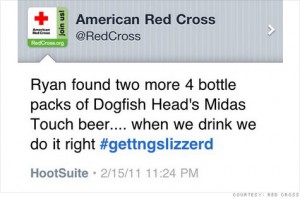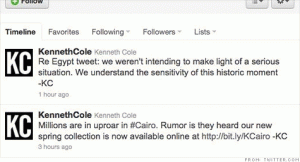In marketing mistakes often happen. In social media marketing there was the famous #MotrinMoms fiasco. In traditional marketing Groupon has recently come under attack for their *insensitive* commercial during the superbowl. In the case of both Motrin and Groupon ads were placed that received backlash from consumers, ultimately leading to the removal of the ads.
These mistakes happened with ads that were well thought out, reviewed by countless people and possibly even focus-group tested.
In the world of social media things move much more quickly. With content posted as-it-happens (often at the discretion of one or two individuals) it is no wonder that mistakes are made.
Two recent mistakes come to mind.
The Red Cross Twitter account accidentally tweeted the tweet below about “getting slizzerd”. The social media manager accidentally posted to the Red Cross account instead of her personal account.
The Red Cross took the error in stride. It responded in jest, tweeting: “We’ve deleted the rogue tweet but rest assured the Red Cross is sober and we’ve confiscated the keys.” The tweet ended up creating a campaign for Dogfish Head beer who ran offers for free beer with blood donations. Clearly this mistake was handled well and actually turned into a positive for both organizations.
Another recent Twitter slip came from Kenneth Cole regarding the Egypt situation. His tweet was considered insensitive, and resulted in significant backlash for the organization. The tweet originated from Kenneth Cole himself in this case, and was quickly followed by a retraction.
People often ask me how they can stay out of trouble in social media, and the truth is that some times it will just happen, and you can’t control it.
Here are some tips that will help keep you out of trouble in social media:
1) Respond Fast
A quick response can often prevent a major blowup (although not in the case of Kenneth Cole). In general, if you have an issue deal with it fast before the conversation gets out of control. The longer you wait the more the conversation progresses without your point of view.
2) If you Mess Up Admit It
If you make a mistake admit it. We all make mistakes, and most people understand that. If you argue or debate (when you are in fact wrong) you will create an even bigger issue. When you are wrong, admit it quickly.
3) Don’t Overreact
Make sure that your reaction is appropriate for the situation. In the Red Cross example they responded quickly with a humorous tweet. When relaying the story to a friend she asked if the social media manager was fired over it. That may have been an overreaction for the error. Don’t over-react to the situation. Respond in-stride. Make sure that your response is appropriate.
4) Have Someone Else Review Your Stuff First
Before you post something (especially something that could be taken the wrong way) have a friend review it first. You don’t need a complex official process, just ask 2 people who walk by your desk to share their thoughts. Some times we aren’t the best judge (especially with humor). Ask for a second or third opinion.
5) Be Direct in Your Response
Respond directly to the issue. If you mess up, offer a clear and direct response. Get to the issue quickly.
6) Offer an Explanation
Explain in a non-defensive way. Most people are reasonable and want to know why you did what you did. Offer an explanation that helps people understand. If you tested the offensive commercial, let people know. People appreciate honesty and can relate to real people.
7) Avoid Politics, Religion or Anything Controversial
Seriously, try not to post about any topics that could get you in to trouble. Also, be careful with topical humor. If people could be offended it is often best to just avoid the subject all together.

































Speak Your Mind